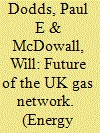|
|
|
Sort Order |
|
|
|
Items / Page
|
|
|
|
|
|
|
| Srl | Item |
| 1 |
ID:
176722


|
|
|
|
|
| Summary/Abstract |
The UK has some of the worst performing residential buildings in the EU from an energy efficiency perspective. Natural gas remains a dominant feature of existing and new-build housing with strong historical, technical, and social barriers to change. Consequently, the residential sector is responsible for significant shares of national emissions and has a strong role to play under ambitious net zero targets.
|
|
|
|
|
|
|
|
|
|
|
|
|
|
|
|
| 2 |
ID:
124256


|
|
|
|
|
| Publication |
2013.
|
| Summary/Abstract |
The UK has an extensive natural gas pipeline network supplying 84% of homes. Previous studies of decarbonisation pathways using the UK MARKAL energy system model have concluded that the low-pressure gas networks should be mostly abandoned by 2050, yet most of the iron pipes near buildings are currently being replaced early for safety reasons. Our study suggests that this programme will not lock-in the use of gas in the long-term. We examine potential future uses of the gas network in the UK energy system using an improved version of UK MARKAL that introduces a number of decarbonisation options for the gas network including bio-methane, hydrogen injection to the natural gas and conversion of the network to deliver hydrogen. We conclude that hydrogen conversion is the only gas decarbonisation option that might enable the gas networks to continue supplying energy to most buildings in the long-term, from a cost-optimal perspective. There is an opportunity for the government to adopt a long-term strategy for the gas distribution networks that either curtails the iron mains replacement programme or alters it to prepare the network for hydrogen conversion; both options could substantially reduce the long-term cost of supplying heat to UK buildings.
|
|
|
|
|
|
|
|
|
|
|
|
|
|
|
|
| 3 |
ID:
171515


|
|
|
|
|
| Summary/Abstract |
Hydrogen can be produced from many different renewable and non-renewable feedstocks and technological pathways, with widely varying greenhouse gas emissions. For hydrogen to have a role in future low-carbon energy systems, it is necessary to demonstrate that it has sufficiently low carbon emissions. This paper explores how green hydrogen has been defined, reviews nascent green hydrogen characterisation initiatives, and highlights the main challenges that standards and guarantee of origin schemes must overcome to develop a market for green hydrogen.
Most existing green hydrogen initiatives are in Europe. In anticipation of a future market for green hydrogen, international standards are starting to be discussed by national and international standardisation organisations and policy makers. A range of approaches have been taken to defining green hydrogen and guarantees of origin. These vary on whether green hydrogen must be produced from renewable energy, on the boundaries of the carbon accounting system, the emission thresholds at which hydrogen is considered green, and on which feedstocks and production technologies are included in the scheme. Decisions on these factors are often influenced by other national and international standards, and the legal framework in which the green hydrogen supply chain operates.
|
|
|
|
|
|
|
|
|
|
|
|
|
|
|
|
| 4 |
ID:
114326


|
|
|
|
|
| Publication |
2012.
|
| Summary/Abstract |
Bioenergy is an important renewable energy resource. However, assessments of the future of bioenergy are beset with uncertainty and contested values, suggesting that a precautionary approach to bioenergy resource development may be warranted.
This paper uses UK MARKAL to examine the implications of adopting a precautionary approach to bioenergy development in the UK. The paper reports a detailed review of UK bioenergy resources and sustainability constraints, and develops precautionary and optimistic resource scenarios. The paper then examines the implications of these scenarios using the energy systems model MARKAL, finding that a precautionary approach adds to the cost of decarbonisation, but does not significantly alter the optimal technology mix. In particular, biomass and co-firing CCS emerge as optimal technologies across scenarios.
The question of UK land availability for bioenergy production is highlighted within the paper. With less land available for bioenergy production, the costs of decarbonisation will rise; whereas if more land is available for bioenergy, then less land is available for either food production or ecosystem conservation. This paper quantifies one side of this trade-off, by estimating the additional costs incurred when UK land availability for bioenergy production is constrained.
|
|
|
|
|
|
|
|
|
|
|
|
|
|
|
|
|
|
|
|
|